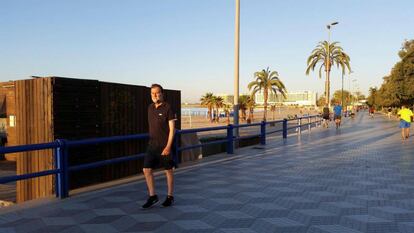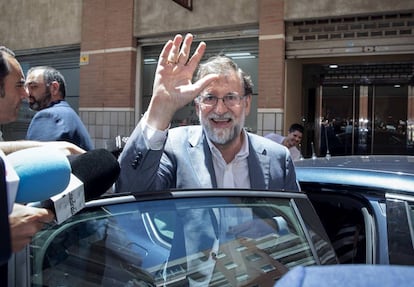From PM to pushing papers: the new life of Spain’s Mariano Rajoy
Reporters tracked the former politician’s first day back on the job as a property registrar in Alicante province

At age 63, former Spanish prime minister Mariano Rajoy has gone back to work as a regular citizen. On Wednesday, 19 days after being ejected from government in a historic no-confidence vote inside Congress, the man who had led the country for the last seven years returned to his old job as a property registrar in the Mediterranean resort town of Santa Pola, Alicante.
“I know you think this is newsworthy and that’s why you’re here, but I don’t have a whole lot more to say other than what I’ve already said in recent days,” he told a pack of reporters waiting for him outside the Registrar’s Office in Santa Pola. “I have retired from politics and I am back where I used to be. Life goes on.”
We have a friend in common, but he was very busy and told me that we will get together next week
Domingo, Santa Pola resident
While his Popular Party (PP) colleagues scramble to see who will replace him at the helm of the party, a position that he renounced soon after being ousted from government, Rajoy is now oblivious to political intrigue, corruption scandals, official trips, the Catalan separatist challenge, and other affairs of state.
Instead, his life will focus on issuing documents pertaining to property ownership, inheritance queries and the like, in a nine-to-five job that represents bureaucracy in its purest form.
After becoming the youngest property registrar at the age of 24, Rajoy is back at his old job nearly three decades later, in a location that is a retirement favorite for thousands of people who are attracted by its sunny climate and beaches.
Santa Pola is currently run by a coalition of four leftist parties with a Socialist Party (PSOE) mayor at the helm, Yolanda Seva. This new government, formed following the municipal elections of 2015, ended three straight terms of absolute power by the PP under Miguel Zaragoza, who recently resigned all his public positions after being targeted in a corruption investigation and arrested.

Santa Pola is a highly desirable placement for registrars. Alicante province tops property-sale charts in Spain, both in absolute and relative terms. According to official data, there were 34,631 properties sold there last year: 5,407 new homes and 29,224 existing homes. In the first quarter of 2018 sales reached 10,232 and there is an upward trend.
The Valencia Registrar Association says it has no specific figures about each office. But some estimates made a decade ago already figured that the Santa Pola office was doing brisk business, making in the range of €1.3 and €1.8 million a year.
“There are many differences between registrar’s offices,” said a spokesperson at the Valencia association. “During the crisis, a lot of them went through tough times and they were forced to lay off personnel.”
The same source said that these public agencies “work practically like a private company: they don’t get money from the state budget and live off their own earnings instead.”
Santa Pola is a highly desirable placement for registrars
Rajoy will now lead a team of seven employees. The windows of his new office face the port of Santa Pola. The office is located on the ground floor of a residential building on Soria street, near a pizza place and an Asian restaurant.
On his first day on the job, Rajoy did not move from his office and did not have to personally meet any of the citizens who showed up with property-related requests. They were instead assisted by personnel at the front desk.
“I wanted to say hi because he signed the title deed to an apartment of mine way back during his first period here, and we have a friend in common, but he was very busy and told me that we will get together next week and have our picture taken,” said a local man named Domingo in statements to reporters.
Miguel Ángel García, the owner of a local real estate agency, has been coming to this office for the last 23 years and he praised the “simplicity” with which Rajoy has taken up his old job, making him the first ex-head of government in Spain’s democratic history to make such a decision.
“He is the man in the street,” he said. “He made an important decision by renouncing the salary he was entitled to as former PM, and his presence here is very good for the visibility of Santa Pola. Others should follow his lead.”
Not everyone in town was as impressed. A passing runner made a joke about the “M. Rajoy” annotation that showed up in documents kept by former PP treasurer Luis Bárcenas, suggesting under-the-table payments given to the former prime minister from a party slush fund. An investigation into widespread political corruption known as the Gürtel case led to the no-confidence vote that unseated Rajoy on June 1.
Others joked about the bird droppings that would fall on Rajoy’s official car due to the large local colony of seagulls – a bird that happens to feature on the logo of the Popular Party.
Rajoy left the office at around 2.15pm, and told the press that “I’ve had time to do lots of things.” Half-a-dozen bodyguards protected him as he left for Alicante to catch a high-speed AVE train headed for Madrid.
English version by Susana Urra.
Tu suscripción se está usando en otro dispositivo
¿Quieres añadir otro usuario a tu suscripción?
Si continúas leyendo en este dispositivo, no se podrá leer en el otro.
FlechaTu suscripción se está usando en otro dispositivo y solo puedes acceder a EL PAÍS desde un dispositivo a la vez.
Si quieres compartir tu cuenta, cambia tu suscripción a la modalidad Premium, así podrás añadir otro usuario. Cada uno accederá con su propia cuenta de email, lo que os permitirá personalizar vuestra experiencia en EL PAÍS.
¿Tienes una suscripción de empresa? Accede aquí para contratar más cuentas.
En el caso de no saber quién está usando tu cuenta, te recomendamos cambiar tu contraseña aquí.
Si decides continuar compartiendo tu cuenta, este mensaje se mostrará en tu dispositivo y en el de la otra persona que está usando tu cuenta de forma indefinida, afectando a tu experiencia de lectura. Puedes consultar aquí los términos y condiciones de la suscripción digital.








































